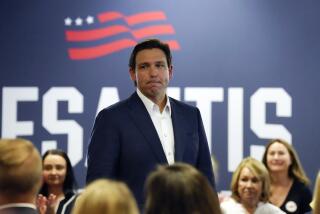Thatcher Puts Historic Facts Over Why
- Share via
LONDON — Which is more important: for pupils to be able to remember, that in 1066 King William of Normandy conquered England and that in 1492 Christopher Columbus sailed the ocean blue--or for them to understand how and why these things happened and why they are considered important?
A long, and at times fierce, debate about teaching of history in Britain has ended in a win on points for those who have greater faith in facts than interpretation. But it looks as though it is only a provisional victory.
The “how and why” school of thought, after dusting themselves off and sharpening their spears, plans to return to the attack. They intend to argue that right-wing political bias and excessive patriotism have been allowed to creep into a proposed history syllabus for British schools.
For Michael Saunders-Watson, the retired naval commander chosen by Prime Minister Margaret Thatcher to chair an inquiry into history teaching, the commotion created by his efforts has come as a surprise.
He had intended to propose to the government a simple framework of history topics for pupils to study. This would be part of a national all-subject curriculum being introduced by the Thatcher government. His task completed, the commander then planned to revert to his normal life as a landowner. Instead he has found himself pinned down in the cross-fire of a battle between two bitterly opposed factions.
An interim report produced by the commander and his team last year put the stress on “historical skills”--for example how to assess documentary evidence--and suggested that the exact recall of dates was less important than knowing why the dates were worth recalling.
But then a perturbed Thatcher lifted the phone. She told Cmdr. Saunders-Watson to think again. The emphasis, she said, must be placed on facts rather than interpretation.
Nor did she agree with the interim report’s proposal that only 40% of pupils’ time should be spent on learning British history, and the rest on world history.
The revised report, published April 3, appears on the surface to give little ground to Thatcher’s viewpoint. “Names, dates and places,” it says, “provide only the starting points of understanding.” But the 320-page document goes on to suggest that a sound knowledge of historical chronology is necessary and lists hundreds of facts pupils must learn.
The amount of time to be spent on specifically British history has been raised to 50%. In addition, it proposes that the history of the British Empire should be taught in terms of the economic, political and diplomatic benefits to Britain.
This prompted Jack Straw, the spokesman on education for the opposition Labor Party, to complain that little attention is paid in the proposed curriculum to anti-colonialism. In a letter to history professors around the country, Straw accused Thatcher of attempting to “subvert the national curriculum to make it more a vehicle for indoctrination than for education.”
The threatened politicization of the debate alarms historians. Norman Stone, professor of modern history at Oxford University, says the argument “should not be between left and right, or between one school of history and another,” but “between parents and educationalists.”
The latter, he says, are too far removed from the classroom and are inclined to devise examinations that fail to test pupils’ knowledge of essential facts.
A history teacher at a London secondary school deplored the “miserable position” held by the subject in the education system. “What most critics of the report fail to realize is that it attempts to rescue history teaching from almost certain oblivion.
“Since the 1960s, there has been no real framework in our schools for teaching history, whether it be British or world history, facts or interpretation. The whole subject has been devalued to a point where pupils in many cases are learning nothing about the past. I welcome any debate that raises the fundamental issues.”
More to Read
Sign up for Essential California
The most important California stories and recommendations in your inbox every morning.
You may occasionally receive promotional content from the Los Angeles Times.










